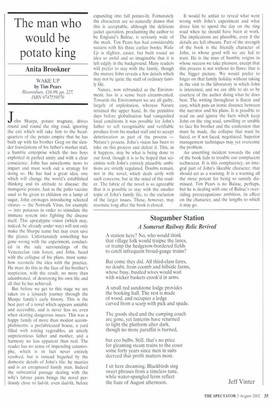The man who would be potato king
Anita Brookner
WAKE UP by Tim Pears Bloomsbury, .i16.99, pp. 227. ISBN 0747559570 John Sharpe, potato magnate, drives round and round the ring road. ignoring the exit which will take him to the headquarters of the potato empire that he has built up with his brother Greg on the slender foundations of his father's market stall, a humble enterprise which the two boys exploited in perfect amity and with a clear conscience. John has unwelcome news to impart and must work out a strategy for doing so. He has had a great idea, one which will change the world's established thinking and its attitude to disease: the transgenic potato. Just as the polio vaccine used to be given to children on a lump of sugar, John envisages introducing selected viruses — the Norwalk Virus, for example — into potatoes in order to stimulate the immune system into fighting the disease itself. This apocalyptic vision (which may, indeed, be already under way) will not only make the Sharpe name but may even save the planet. Unfortunately something has gone wrong with the experiment, conducted in the safe surroundings of the Venezuelan rain forest, and John, faced with the collapse of his plans, must somehow reconcile the idea with the practice. He must do this in the face of his brother's scepticism, with the result, no more than adumbrated, of destroying his own life and all that he has achieved.
But before we get to this stage we are taken on a leisurely journey through the Sharpe family's early history. This is the best part of a novel which appears amiable and accessible, and is never less so, even when skirting dangerous issues. This was a happy family of more than modest accomplishments: a prefabricated house, a yard filled with rotting vegetables, an utterly unpretentious father and mother, and a harmony no less apparent than real. The reader has no sense of impending catastrophe, which is in fact never entirely resolved, but is instead beguiled by the domestic details of John's life: he marries and is an enraptured family man. Indeed the substantial passage dealing with the wife's labour pains brings the novel perilously close to lad-lit, even dad-lit, before expanding into full potato-lit. Fortunately the characters are so naturally drawn that this is acceptable, although the delirious jacket quotation, proclaiming the author to be England's Balzac, is seriously wide of the mark. Tim Pears has had considerable success with his three earlier books: Wake Up is slighter, easier, but built round an idea so awful and so imaginable that it is left edgily in the background. Many readers will prefer to stay with the family, though the mature John reveals a few details which may not be quite the stuff of ordinary family life.
Nature, now rebranded as the Environment, has in a sense been circumvented, Towards the Environment we are all guilty, largely of exploitation, whereas Nature retained the upper hand. In the primitive days before globalisation had vanquished local conditions it was possible for John's father to sell recognisable and verifiable produce from his market stall and to accept deterioration as part of the process — Nature's process, John's vision has been to take on this process and defeat it. This, as it happens, may be what is being done to our food, though it is to be hoped that scientists with John's entirely plausible ambitions are strictly regulated. Doubts remain, not in the novel, which deals airily with such concerns, but in the mind of the reader. The fabric of the novel is so agreeable that it is possible to stay with the smaller topic of John's family life, to the exclusion of the larger issues. These, however, may resonate long after the book is closed. It would be unfair to reveal what went wrong with John's experiment and what drove him to spend the day on the ring road when he should have been at work. The implications are plausible, even if the details are left obscure. Part of the strength of the book is the friendly character of John, in whose good will we are led to trust. He is the man of humble origins in whose success we take pleasure, except that this process is not without its flaws: that is the bigger picture. We would prefer to linger on that family holiday without taking in the visit to the laboratory in which John is interested, and we are able to do so by courtesy of the author doing what he does best. The writing throughout is fluent and easy, which puts an ironic distance between the narrator and his plans. It is possible to read on and ignore the facts which keep John on the ring road, unwilling or unable to face his brother and the confession that must be made, the collapse that must be faced, or if not faced, negotiated. Superior management techniques may yet overcome the problem.
An unsettling incident towards the end of the book fails to trouble our complacent technocrat. It is this complacency, an integral part of John's likeable character, that should act as a warning. It is a warning all the more potent for being so sunnily dismissed. Tim Pears is no Balzac, perhaps, but he is dealing with one of Balzac's overriding preoccupations: ambition, its effect on the character, and the lengths to which it may go.


























































 Previous page
Previous page